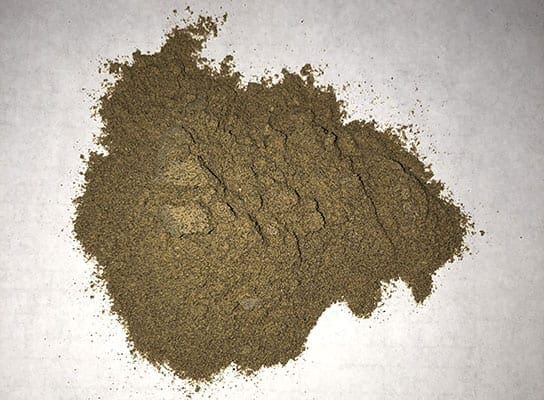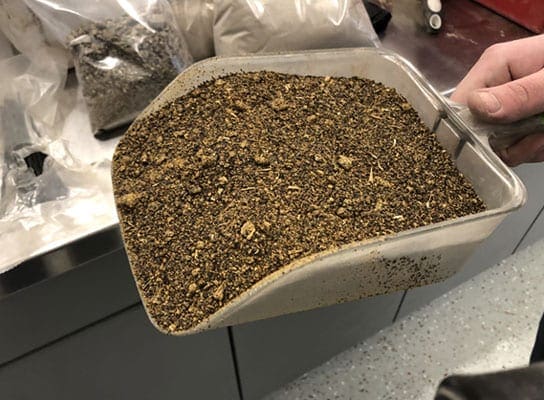Dil seçin:
The STET elektrostatik ayırma işlem tamamen kuru, su veya kimyasal gerektirmeyen. Kuru elektrostatik ayırma yöntemleri yeni ve daha işlevsel bitki protein ürünleri üretmek için bir fırsat sunuyor, yüksek değerli bir hayvan yemi olarak kullanılmak üzere artırılmış protein içeriğine sahip kanola tohumu küspesi veya kolza tohumu küspesi dahil. This protein-enriched seed meal can be used as a non-GMO replacement for soy meal and add value to oil-crushing operators and feed producers.
Pilot test için STET tarafından solventle ekstrakte edilmiş kanola küspesi numunesi satın alındı. Kanola yemeği ince öğütülmüştü. (Kuru) bir çekiç değirmeni kullanarak. Başlangıç parçacık boyutundan (D50) in 500 mikron, the canola meal was reduced to a fine particle size appropriate for the STET separator at an energy consumption of less than 60 ton başına kW. İnce öğütülmüş kanola tohumu unu proteinmükemmel ayrılması gösterdi. İçerme örneği 36-38% protein (Kuru olarak) was separated into a protein-enriched product in a single pass through the STET separator.

The STET tribo-electrostatic kemer ayırıcı demonstrated the capability to process finely ground canola meal to significantly upgrade the protein content, hayvan yemi olarak daha değerli hale getirmek. The only material that was prepared prior to its introduction into the STET separator was grinding, hangi başarıyla bir çekiç fabrikası kullanılarak gerçekleştirildi, yağlı tohum işleme sektöründe yaygın olarak kullanılan olgun bir teknoloji. The STET triboelectric belt separator offers many benefits for processing canola seed meal and rapeseed meal, including continuous operation, kadar yüksek bir besleme hızı 15 saat başına ton yem, düşük enerji tüketimi, Kullanım kolaylığı, ve yüksek mekanik güvenilirlik.

The name “rapeseed” comes from the Latin word “rapum,” which means turnip. Rapeseed belongs to the Brassicaceae family, which includes cabbage and mustard, sharing similar characteristics with root crops like turnips.
Rapeseed and canola are closely related but not identical. Canola is a variety of rapeseed that has been selectively bred to have lower levels of erucic acid, making it safer for consumption and more suitable for oil production.
The primary difference between a canola meal and a rapeseed meal lies in their content of erucic acid and glucosinolates. Canola meal is made from canola, which has low levels of these components, while rapeseed meal may have higher levels, affecting its suitability for some applications.
Rapeseed meal is a valuable protein source in animal diets, providing essential amino acids for livestock. It is often used as an affordable alternative to soy meal, boosting the nutritional content of feed and supporting healthy growth and productivity in animals.
Rapeseed meal contains essential nutrients like proteins, lif, and minerals, which are beneficial for animal nutrition. Ancak, traditional rapeseed meal may also contain antinutrients and toxicants such as glucosinolates and erucic acid, necessitating processing to reduce these components for safe and effective use in feed.